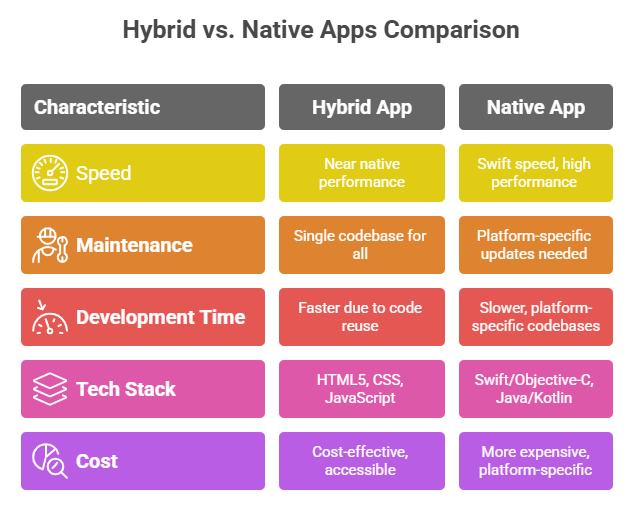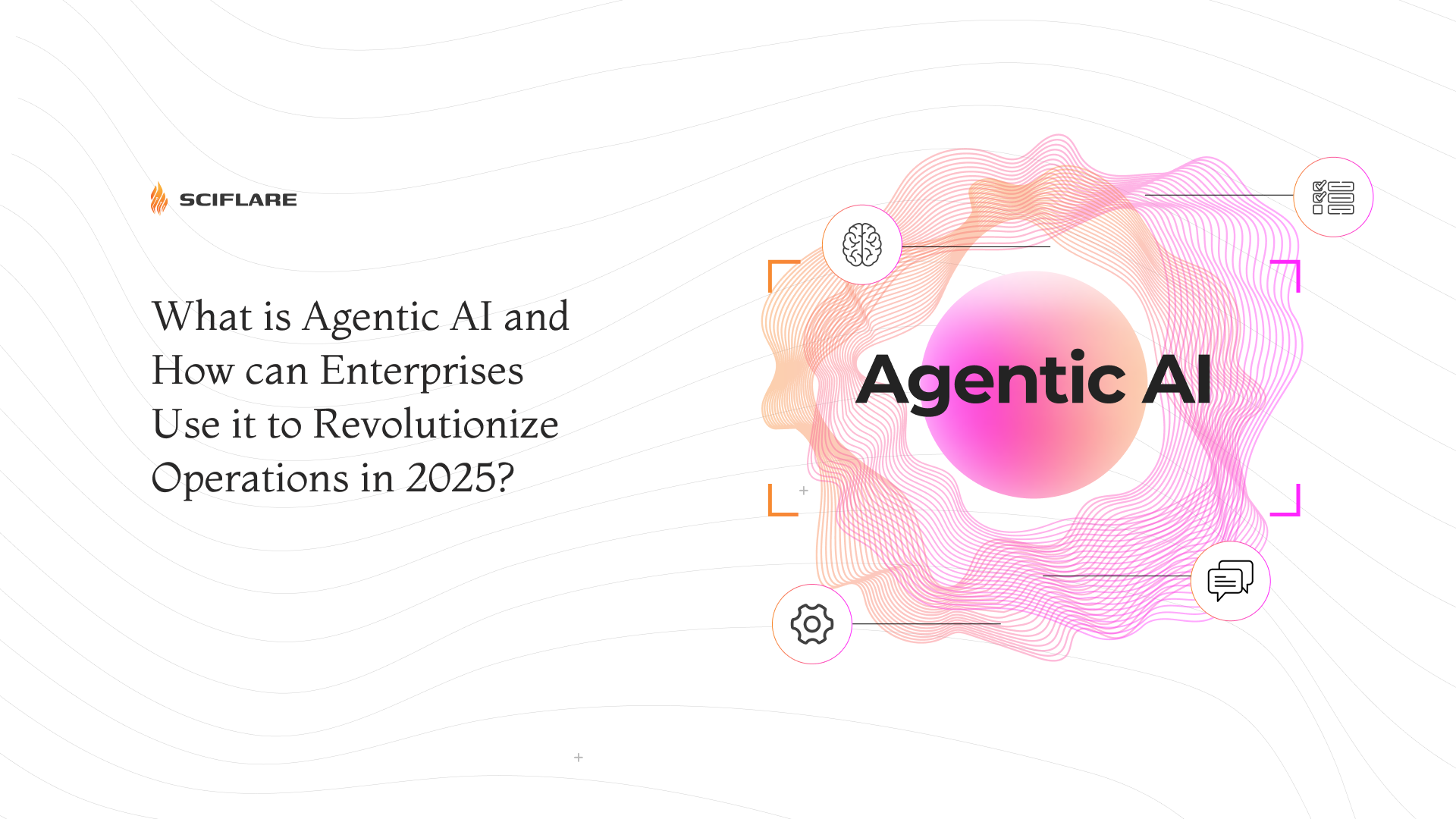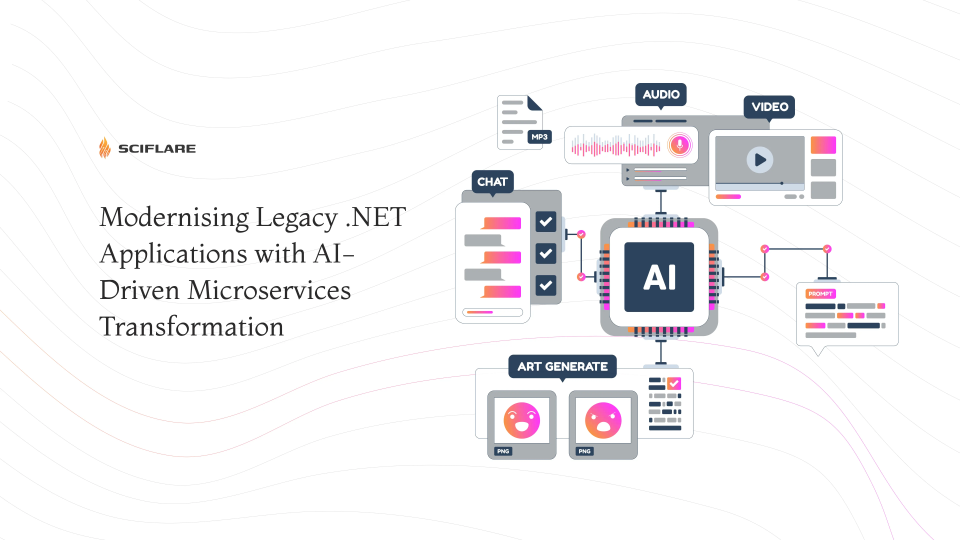
Hybrid vs Native App Development: Which is The Right Choice For Your Business?
Written by: Shiva Kumaran
Quick Summary
Hybrid apps combine elements of native and web apps, and offer cross-platform compatibility with a reusable codebase across all platforms.
Native apps are specifically designed for the needs of each platform, necessitating separate codebases for Android and iOS.
The choice between hybrid vs native app development depends on a combination of factors like budget, timeline, performance requirements, and user base.
Introduction
Mobile app development is a top priority for all businesses in today’s digital world. It is the medium through which businesses interact with customers, create value, and propel their growth by leaving behind past inefficiencies. According to a report by Bankmycell, there are approximately 8.93 million smartphone apps worldwide (as of January 2025). However, app development must align with business objectives to deliver desired results. In this context, native and hybrid app development emerge as top choices for businesses looking to establish their digital presence and expand their user base.
Native development refers to developing platform-specific applications, while hybrid development refers to developing cross-platform apps, combining web and native elements. This blog will help you understand Hybrid vs Native app development and decide when you should opt for either.
What Is Hybrid App Development?
A hybrid app combines native elements (elements of apps developed specifically for Android and iOS platforms) and web apps (apps that can be accessed via an internet browser). Hybrid app development is the process of creating these applications. A hybrid app development company leverages widely used frontend languages like CSS, JavaScript, and HTML5 and offer cross-platform compatibility, eliminating the need to maintain and deploy separate codebases for Android and iOS platforms.
What Is Native App Development?
The process of developing applications specifically for each platform is known as native development. A native app development company leverages platform-specific programming languages, such as, Java and Kotlin for Android development, and Swift or Objective-C for iOS development. As such, native apps are fully optimized according to the needs of each platform and offer top-notch performance by unlocking each platform’s complete potential.
Key Differences: Hybrid vs Native Mobile App Development

Now that you understand the basic difference between hybrid and native apps, let us compare them against key parameters to help you decide what best suits your needs:
1\. Hybrid App Speed vs Native App Speed
Native apps offer swift speed and high performance with their platform-specific and streamlined code. These apps enable swift display by pre-loading most elements. Hybrid apps, on the other hand, offer near native performance as their native shells connect with device-specific capabilities via an embedded web browser once a user installs it locally after downloading it from an app marketplace.
2\. App Maintenance
While choosing between hybrid and native app, it is necessary to understand the maintenance requirements for each. Hybrid apps offer cross-platform compatibility, meaning a single codebase is deployed across all platforms. As such, all updates and bug fixes can be deployed across all platforms at once. However, for native apps, maintenance updates and bug fixes need to be rolled out for Android and iOS platforms specifically, ensuring there are no consistency issues.
3\. Development Time
The major difference between hybrid and native app solutions is that hybrid apps use a single codebase that can be deployed across all platforms, while native apps use platform-specific codebases. As such, hybrid apps accelerate development and reduce time to market with their code reuse, which native apps cannot offer.
4\. Tech Stack
While comparing hybrid vs native app development, the tech stack makes a major difference. Hybrid apps use popular frontend technologies like CSS, JavaScript, and HTML5, while native apps use platform-specific technologies like Swift and Objective-C for iOS, and Java and Kotlin for Android. As such, native app development requires platform-specific development expertise, and hybrid apps require experts in frontend and cross-platform compatibility.
5\. Cost of building native vs hybrid apps
In the native vs hybrid cost comparison, hybrid apps stand out for their cost -effectiveness and accessibility for businesses of all sizes. With a single codebase compatible with multiple platforms, businesses can save extensively on the costs required for platform-specific development, maintenance, and specialized expertise for native app development.
Hybrid Vs Native Performance: Which Is Better?
When it comes to the hybrid app speed vs native app speed, native apps emerge as the clear winner. This is because native apps are fully optimized according to the nuances of each platform and offer faster responses to deliver unprecedented performance. By offering faster responses, native apps enhance the user experience of graphic-intensive apps as well.
Additionally, native apps have direct access to complete platform-specific features, including all OS and hardware functionality, and this facilitates seamless integration with each device’s features like notifications, GPS, camera, and so on. Some examples of native apps include Spotify, Google Maps, and WhatsApp, among others. These universally popular apps leverage native app development to offer intuitive, responsive, and quick user responses by unlocking the complete potential of Android and iOS platforms.
Hybrid apps, on the other hand, can access the device’s native capabilities with their native shells and offer near native performance. While this is not comparable to native performance, it can facilitate businesses to go to market with a highly effective solution that caters to users on Android and iOS platforms. Top hybrid apps include Instagram, Gmail, and Amazon App Store, among others. Instagram, in particular, is a brilliant use case for React Native app development, enabling the company to scale effortlessly by reaching users on both platforms, starting off originally as a native app for mobile users.
What Is The Cost Of Developing Native vs Hybrid Apps?
It must be said that native apps have a higher time to market than hybrid apps because of their platform-specific development, maintenance, and expertise. As such, Android app development services can range from $10k-$300k, while enterprise Android services can range from $30k-$600k, spanning a timeline of 2-12 months depending on exact business requirements.
Hybrid apps have a time to market of 2-12 months, and the development cost can range from $15k to $300k, depending on exact business needs, tech stack, purpose, and features.
When To Choose Hybrid For Your Business?
Discussed below are instances when hybrid app development is the best choice for businesses:
1\. Faster Iterations
Businesses looking to go to market faster with quick iterations and MVP launch should consider hybrid app development as it can accelerate development with its code reuse across platforms.
2\. Cost Consciousness
Businesses, particularly startups, or those looking to test an idea with minimal investment, find hybrid app development to be their top choice as it eliminates the need for the development, deployment, and maintenance of platform-specific codebases. Additionally, with their code reuse, hybrid apps eliminate the need to invest in platform-specific development teams, streamlining development costs significantly.
3\. Multi-Platform Compatibility
Businesses looking to expand their digital presence and reach users across different platforms quickly and cost-effectively should opt for hybrid app development. This is because hybrid apps enable code reuse and eliminate the need for extensive platform-specific development.
4\. Lack of native development expertise
Native development requires extensive platform-specific development expertise as opposed to hybrid apps. When specialized expertise for iOS and Android development is not available, hybrid app development is considered the best option.
5\. Targeting mobile and web users
Hybrid apps combine the elements of native and web apps and enable businesses to cater to users on web and mobile platforms seamlessly.
When To Choose Native For Your Business?
Discussed below are instances when native app development is the best choice for businesses:
1\. Intuitive User Experience
While comparing hybrid vs native app development, native apps stand out for intuitive user experiences by following platform-specific design guidelines from scratch and giving Android and iOS users unprecedented ease of use.
2\. High-Performance Applications
Some applications, such as those for gaming, graphic-intensive, or those requiring real-time interaction, benefit more from iOS and Android native app development. This is because native apps are fully optimized according to the needs of each platform and meet high performance needs optimally.
3\. Platform-specific Target Audience
In the hybrid vs native app development comparison, native app development stands out if your target users are on a particular platform. For instance, iOS has a stronger user base in the US, while Android has a bigger user base in India. Regional specifics like these determine the choice of native or hybrid for your app development needs.
Native vs Hybrid: Which Technology Is Better?
The choice of native or hybrid app development will depend entirely on business needs, budget, development timeline, and performance expectations. As a mobile application development company specializing in delivering solutions tailored to business needs across industries, we suggest entrepreneurs to carefully consider the above-mentioned factors and decide between native or hybrid development wisely. This is because technology should be aligned to your business needs and support your growth goals, rather than add more complexity that impedes your day-to-day functioning. With over ten years of experience delivering native and hybrid apps as per business needs, we are ready to guide you in your app development efforts with end-to-end development expertise, tech stack guidance, and strategies for aligning technology with business needs. Get in touch with us and develop apps users love!
Also read: https://www.sciflare.com/blog/hybrid-app-development-india/
FAQs
1. Cross-platform vs native development: which is better?
Cross-platform development is better if you want to expand your digital presence across all platforms quickly and cost-efficiently. This becomes possible with code reuse in cross-platform apps, eliminating the need for developing and maintaining separate codebases for Android and iOS platforms. Native development is better if your target users are mostly concentrated on one platform, consistent high-performance and quick responses are necessary for your platform, and you have the time required for developing and maintaining separate codebases for each platform.
2. Which is the best mobile app development company in Chennai?
Sciflare Technologies is the best mobile app development company in Chennai with over ten years of experience in delivering high-performing mobile apps tailored to unique business needs. With our expertise in native, hybrid, and cross-platform app development, we deliver solutions for every business need leveraging our in-depth knowledge of cutting-edge technologies, and help business achieve their revenue and growth goals. Our client base including the industry’s biggest names like Dream 11, Boomer 11, HDFC Life, Hofincons, and others bear testimony to our commitment for digital excellence.
3. How to choose tech stack for enterprise mobile application?
Choosing the tech stack for an enterprise mobile application is a crucial decision based on a combination of factors like project complexity, feature and functionality required, development platform based on where target users are, time to market, scalability, and performance requirements. Get in touch with us to discuss your exact enterprise needs and we will help you develop a solution that eliminates all your organizational problems, unlocking your complete potential.
4. When to choose hybrid over native app development?
You can choose hybrid over native app development when you require cross-platform compatibility and need to reach users on different platforms quickly and cost effectively. This is particularly useful if you want to reduce your time to market.




